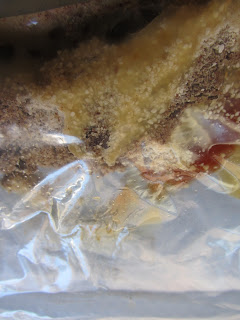There's definitely some stress right before the holiday. Having everything ready makes you suffer a bit.
But I guess it's all on purpose, as once the festive dinner --the Seder--starts, we can taste the relief and freedom that we are supposed to savor this time of the year. We are not slaves anymore, and we are hoping we can continue to be free for all the generations to come.
The story is told among symbols of tears, bitterness, miracles, and sweetness. There's despair, fear, faith and hope. It's just like life itself. But this time, we make sure we take a break from every day life and appreciate the difference of what it was, what it is and what it could be.
There are also the 4 required cups of wine, that I obediently drink and then I feel so free!!!! My kids play with their cousins and show off all their school acquired Passover knowledge (that cost us a fortune, but as Master Card says: "it's priceless") and celebrate the moment as the best time of their lives. And why shouldn't they? Thankfully, this Passover, we are free, together, healthy and eating catered matzah ball soup. How better can life get?
Despite ordering in the whole Seder meal at the local kosher store, every year I try to make my own charoset, the mortar-like food that has different recipe depending on each household. Mine was given to me by my maternal grandmother, who in turn, got it from her Turkish grandmother, and in a holiday that celebrates Jewish generations, my great grandmother's charoset makes me celebrate a delicious preparation and the generations that made up, make up and-- hopefully-- will make up my family. From Turkey, to Mexico and now in sunny Florida shared with my Brazilian and Belgian relatives...
But, besides being an important link to my family and my origins, this is a delicious recipe. The following in an email from my friend (and former boss), the Vice president of the James Beard Foundation, Mitchell Davis. I had shared the recipe with him and he used it about 5 years ago at a presentation. He later included it in his cookbook Kitchen Sense.
"[We] gave our talk this weekend on Jewish Food and Identity at Kolel: The Center for Jewish learning in Toronto. We included a demo of rugelach and different charoseths, and of course, yours was by far the favorite. Everyone loved it. My sister wanted to use it as a breakfast spread. So now there will be people in Toronto making the Zohn family chroseth (or whatever family it's from). Hope all is well. Many thanks. Mitchell"
I do hope that you make it too! And it's incredible smeared on matzah for breakfast in Passover (Mitchell's sister was right on!)
GREAT GRANDMOTHER ROSA COHEN'S CHAROSET
I'm sure this recipe was originally made by hand with a mortar and pestle in my great grandmother's kitchen in Smyrna, Turkey. My grandmother makes it in the blender. At home, I use my immersion blender, but a food processor works just fine.
Once, I found myself without fresh apples, and since I did have some unsweetened apple sauce, I took that route. These days, I don't even bother with a machine for pureeing. I buy ground nuts and throw everything on a Ziploc bag. For some reason, and despite lots of changes in the ingredients and techniques, it's a very forgiving recipe and always ends up being delicious.
INGREDIENTS
- Vegan
- Free of: eggs, soy, dairy
1 organic Gala apple, peeled, seeded and cubed OR 3/4 cup unsweetened apple sauce
6 pitted dates
1/2 cup raisins
Juice of 1 orange
2 to 3 tablespoons orange preserves (or apricot if you can't find orange)
3 tablespoons matzah meal
1 1/2 ground nuts (I like pecans, but walnuts, hazelnuts or a mix work well too. I think hemp seeds might be a good substitution if you can't use nuts)
METHOD
Enjoy and have a meaningful, redeeming and wonderful Passover (or Easter, where it can also be served).





1 comment:
Totally making this for E, with pre-checked hemp seeds :)of course! Thanks!!
Post a Comment